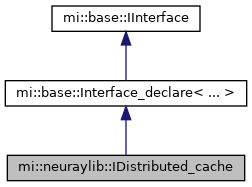The distributed cache service can be used to create temporary objects in a cluster. More...
#include <idistcache.h>

Public Member Functions | |
| virtual void | register_receiver (base::Uuid class_id, IObject_receiver *receiver)=0 |
| Registers a receiver with the distributed cache. More... | |
| virtual void | unregister_receiver (base::Uuid class_id)=0 |
| Unregisters a receiver with the distributed cache. More... | |
| virtual Sint32 | store_object (ISerializable *serializable, bool cluster_only=true)=0 |
| Stores an object in the distributed cache. More... | |
| virtual void | remove_object (ISerializable *serializable)=0 |
| Removes an object from the cache. More... | |
 Public Member Functions inherited from mi::base::IInterface Public Member Functions inherited from mi::base::IInterface | |
| virtual Uint32 | retain () const =0 |
| Increments the reference count. More... | |
| virtual Uint32 | release () const =0 |
| Decrements the reference count. More... | |
| virtual const IInterface * | get_interface (const Uuid &interface_id) const =0 |
| Acquires a const interface from another. More... | |
| template<class T> | |
| const T * | get_interface () const |
| Acquires a const interface from another. More... | |
| virtual IInterface * | get_interface (const Uuid &interface_id)=0 |
| Acquires a mutable interface from another. More... | |
| template<class T> | |
| T * | get_interface () |
| Acquires a mutable interface from another. More... | |
| virtual Uuid | get_iid () const =0 |
| Returns the interface ID of the most derived interface. More... | |
Additional Inherited Members | |
 Public Types inherited from mi::base::Interface_declare< 0x29582fa9, ... > Public Types inherited from mi::base::Interface_declare< 0x29582fa9, ... > | |
| typedef Interface_declare< id1, ... > | Self |
| Own type. More... | |
| typedef Uuid_t< id1, ... > | IID |
| Declares the interface ID (IID) of this interface. More... | |
 Public Types inherited from mi::base::IInterface Public Types inherited from mi::base::IInterface | |
| typedef Uuid_t<0, 0, 0, 0, 0, 0, 0, 0, 0, 0, 0> | IID |
| Declares the interface ID (IID) of this interface. More... | |
 Static Public Member Functions inherited from mi::base::Interface_declare< 0x29582fa9, ... > Static Public Member Functions inherited from mi::base::Interface_declare< 0x29582fa9, ... > | |
| static bool | compare_iid (const Uuid &iid) |
Compares the interface ID iid against the interface ID of this interface and of its ancestors. More... | |
 Static Public Member Functions inherited from mi::base::IInterface Static Public Member Functions inherited from mi::base::IInterface | |
| static bool | compare_iid (const Uuid &iid) |
Compares the interface ID iid against the interface ID of this interface. More... | |
The distributed cache service can be used to create temporary objects in a cluster.
The distributed cache manages the distribution of objects and triggers the destruction of objects. The objects will exist on every host in the cluster. The creating host is the owner of an object, each object can have only one owner. It will be destroyed on remote hosts when the owner removes the object or when the owner leaves the network. A stored object can be changed but no synchronization of changes with other hosts is done.
|
pure virtual |
Registers a receiver with the distributed cache.
Each receiver will be responsible for one or more class IDs. It will be invoked when a remote host stored an object with one of the class IDs the receiver is responsible for. It will also be invoked when the object needs to be destroyed.
A previously registered receiver for this class ID will be unregistered.
| class_id | ID of the class this receiver will handle |
| receiver | The receiver object |
|
pure virtual |
Removes an object from the cache.
The distributed cache notifies all hosts which received the notification from the store_object() call. The object itself is not destroyed or otherwise touched in any way.
| serializable | The object to remove |
|
pure virtual |
Stores an object in the distributed cache.
The distributed cache notifies all remote hosts in either the whole network or in the cluster only (default) provided they registered a receiver for the corresponding class ID. Hosts which join after the object was stored but before the object was removed will also get notified.
| serializable | The object to store |
| cluster_only | The flag indicates if the object is stored globally or only in the cluster. |
|
pure virtual |
Unregisters a receiver with the distributed cache.
The cache will then remove all information about all objects of the given class ID to avoid calling the receiver in a later destroy_object() call. It will not call the destroy_object() function for any one of the removed objects during removal of the information about these class IDs.
| class_id | ID of the class this receiver handled |